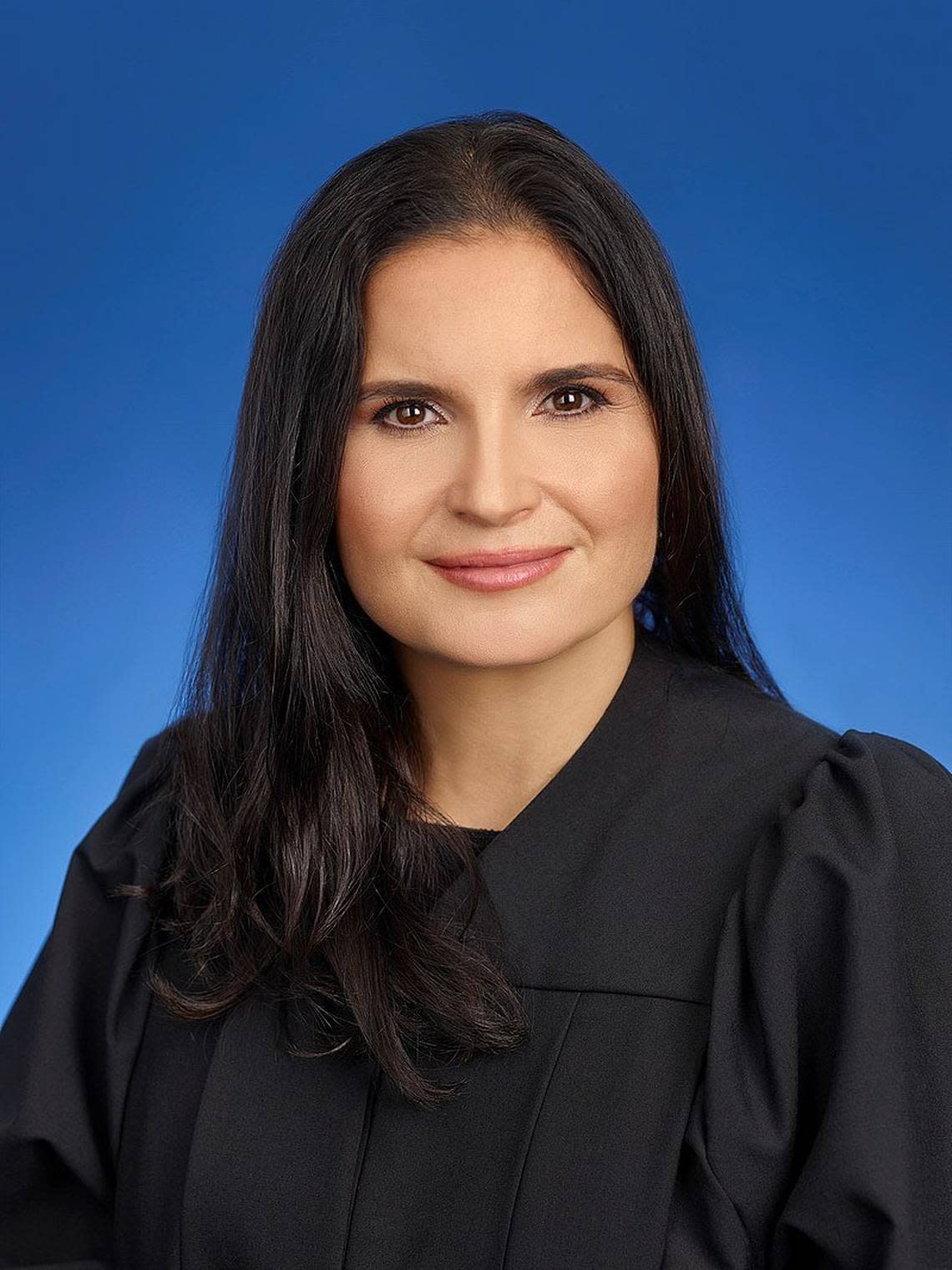Trump-appointed judge at center of ex-president’s FBI fight. Who is Aileen Cannon?
Like many of the federal judges nominated by Donald Trump during his presidency, Aileen Cannon was young and conservative when the Senate confirmed her in November 2020 to serve a lifetime appointment in the Southern District of Florida.
The 41-year-old Cannon, who sits on the bench in the outlying Fort Pierce federal courthouse, is now at the helm of the biggest case in her brief judicial career: Trump’s effort to thwart a Justice Department investigation of his possible mishandling of hundreds of classified documents relating to national security that he took from the White House to his Palm Beach estate at Mar-a-Lago last year.
Cannon, who was raised in Miami by a mother from Cuba and a father from Indiana, handed Trump a temporary victory this week. She ruled that a neutral arbiter should be appointed to review potentially privileged records that FBI agents took from Trump’s residence during an Aug. 8 raid, stalling the Justice Department’s criminal case.
Cannon sided with Trump, who appointed her as a judge, instead of the Justice Department, for which she once worked as a federal prosecutor in South Florida.
In doing so, she put the Justice Department’s probe on pause, saying that investigators could not move forward until a “special master” reviewed thousands of government records and other materials, including attorney-client and executive-privileged documents along with possible classified information. Her decision, however, did not stop the Justice Department from conducting other aspects of its probe, including interviewing witnesses, or intelligence agencies from evaluating the potential threat of Trump’s removal of the classified records.
Still, some legal experts say her actions betray her loyalty to Trump, even though her decision is limited to the “special circumstance” of reviewing records taken from the former president’s residence.
“By her own words, she is saying this is a Trump ruling,” said former federal prosecutor Mark Schnapp, a criminal defense attorney in Miami.
Another former federal prosecutor, Michael Sherwin, who worked with Cannon in the U.S. Attorney’s Office in South Florida and knows her personally, said she may be conservative but she is not a partisan judge who would do favors for anyone. Her only interest, he said, is ensuring there are no privileged documents mixed up with other evidence in the Justice Department’s case against Trump.
“She’s going to treat this case in a nonpartisan way,” said Sherwin, a former Naval intelligence officer who worked for the U.S. Attorney’s Office in Miami and served as the acting U.S. Attorney in Washington in the Trump administration. “She’s perfecting the ability of the government not to taint its own case with privileged records.”
Federal prosecutors have challenged her decision to an appeals court in Atlanta, while asking the judge to let their criminal probe of the classified materials continue and to block the special master from reviewing any of those highly sensitive government documents.

Heavy scrutiny
Only time will tell whether Cannon, who has been a member of the conservative Federalist Society for nearly two decades and was recruited as a federal judge by Florida Republican Sen. Marco Rubio, has flubbed the highly publicized case.
After issuing her 24-page ruling on Monday, Cannon drew praise from the ex-president and his supporters but derision from his enemies and numerous legal experts, even notable conservatives such as William Barr, the former attorney general in the Trump administration.
“The opinion, I think, was wrong, and I think the government should appeal it,” Barr said in an interview on Fox News on Tuesday, before the Justice Department filed its appeal Thursday. “It’s deeply flawed in a number of ways. I don’t think the appointment of a special master is going to hold up.”
Barr, who previously noted it’s “unprecedented” for a former president to take classified information to his home, said “the law here, I think, is pretty clear that the Justice Department should be able to review these documents.”
Jason R. Baron, a former director of litigation at the National Archives and Records Administration, which has been battling with Trump to retrieve government documents from him and made a criminal referral to the Justice Department, said the Presidential Records Act allowed the former president “to take truly personal records out of the White House.”
“But the personal records provision in the law is very limited: it applies to diaries, journals, and other documents that have nothing to with the president’s official business.”
“Moreover, no classified record would ever be properly categorized as personal,” said Baron, a professor at the University of Maryland. “The long and the short of it is that no records pertaining to government business should have been at Mar-a-Lago — they are the American people’s records, not the personal records of a former president.”
In opposing the appointment of a special master, Justice Department lawyers told Cannon that they had already sorted through the documents seized at Mar-a-Lago, using a “filter team” to separate out 520 pages of potentially privileged documents between Trump and his private attorneys. That arrangement was approved by Magistrate Judge Bruce Reinhart when he authorized the search warrant for Trump’s Palm Beach residence, which focused on a storage area and his office.
Trump’s attorneys bypassed Reinhart, whom the former president has vilified, in order to file their lawsuit seeking an independent review of the seized Mar-a-Lago documents in Fort Pierce, where Cannon is the lone federal judge. Instead of recusing herself or the suit being referred to Reinhart, Cannon took the case.

Becoming a judge
Cannon, who was born in Cali, Colombia, but grew up in Miami along with an older sister, seemed destined for a successful professional career. She graduated from Ransom Everglades, an exclusive private school in the Coconut Grove area, and then graduated from Duke University, spending a semester in Spain and a summer writing short feature articles for El Nuevo Herald in Miami. She graduated magna cum laude from the University of Michigan Law School and clerked for the Eighth U.S. Circuit Court of Appeals in Des Moines, Iowa, and later landed a job at the prominent Washington law firm, Gibson, Dunn & Crutcher.
In 2013, Cannon was hired as a federal prosecutor with the U.S. Attorney’s Office in Miami, where she worked at first in the major crimes sections and then transferred to the appellate section involving convictions and sentencings. She completed a handful of trials to verdicts but had more experience as a legal writer, according to her application to become a federal judge. Some of her colleagues, who did not want to be identified, said she was smart, analytical, serious and likable.
“It was all positive,” said one former senior prosecutor in the Miami office. “She had a good reputation.”
While she continued to work in the federal appellate division, Cannon transferred to the Fort Pierce office and settled in the Vero Beach area with her husband, Josh Lorence. He is an executive for Bobby’s Burgers, the celebrity chef Bobby Flay’s fast-casual restaurant chain. They have two children.
In June 2019, Cannon was contacted via email by Rubio’s Senate office to see if she would be interested in applying for an open federal judge position. She applied that same month and went through the long process of interviews, including with the White House. Trump nominated Cannon in April 2020. The Senate confirmed her by a 56-21 vote in that November, after Trump lost the presidency to Joe Biden.
Cannon’s biggest case
Cannon’s judicial career was under the radar until Trump’s lawsuit challenging the Justice Department’s classified documents case landed in the Fort Pierce courthouse last month.
Trump’s critics accused his lawyers of “forum shopping” because Cannon was appointed by the former president. They also said she should have recused herself or turned over the case to Reinhart, who had approved the FBI search for Trump’s estate at Mar-a-Lago.
But her ruling on Trump’s request to appoint a neutral arbiter to review privileged records seized at his Palm Beach residence attracted outright contempt.
One section of her ruling stuck out to critics, as if she were going out of her way to treat Trump, as the former president, differently from other potential targets of criminal investigations. Legal experts noted that part of her analysis was flawed because the Justice Department has no intention of charging Trump with privileged documents taken from Mar-a-Lago but would rely instead only on classified materials that he took from the White House to his Palm Beach home.
“As a function of [Trump’s] former position as President of the United States, the stigma associated with the subject seizure [at Mar-a-Lago] is in a league of its own,” Cannon wrote in her Sept. 5 decision. “A future indictment, based to any degree on property that ought to be returned [to him], would result in a reputational harm of a decidedly different order of magnitude.”
Miami attorney David Weinstein, who was the head of the public corruption and narcotics sections in the U.S. Attorney’s Office, said that “investigations and resulting prosecutions are always stigmatizing and harmful to the reputations of the targets — that is why details of ongoing investigations are closely held prior to charges being filed.
“Her order appointing a special master to evaluate the documents seized from the former President’s residence could be interpreted as providing greater deference to the target of this particular investigation than is usually necessary,” he said.
Several conservative legal experts in addition to Barr have expressed concern or skepticism over Cannon’s decision to order the appointment of a special master.
Ty Cobb, part of the White House legal team in the Trump administration, told CBS on Friday that he agreed with Barr that the underlying facts of the case don’t change with Cannon’s order.
“It’s a speed bump — it’s not going to delay anything,” Cobb said.
Paul Rosenzweig, who served as senior counsel to Ken Starr, the independent counsel who investigated President Bill Clinton, characterized Cannon’s special master ruling as “corrupt.”
“I think it is a special law just for Donald Trump by a Trump appointee, and it is unmoored from precedent, insupportable in law, [and] will not be approved of by anybody who isn’t a Trump fanatic,” Rosenzweig told NBC.
This is not the first time that Trump has tried to steer a case to Cannon.
Earlier this year, a federal judge presiding over a lawsuit brought by Trump against Hillary Clinton in Florida suggested the former president had actively sought out Cannon to oversee the case, implying that Trump thought he would get more favorable treatment from her.
Trump had been trying to get the judge, Donald Middlebrooks, based in West Palm Beach, to recuse himself from the case. Middlebrooks did not, and he ultimately dismissed Trump’s case on Friday.
“I note that [Trump] filed this lawsuit in the Fort Pierce division of this District, where only one federal judge sits: Judge Aileen Cannon, who Plaintiff appointed in 2020,” Middlebrooks wrote in a footnote rejecting Trump’s efforts to remove him. “Despite the odds, this case landed with me instead. And when Plaintiff is a litigant before a judge that he himself appointed, he does not tend to advance these same sorts of bias concerns.”
Miami Herald staff writer Ana Claudia Chacin contributed to this report.
